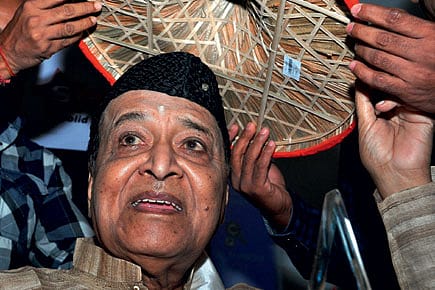Bhupen Hazarika

When Hazarika turned 80, he offered to marry partner Kalpana Lajmi
Assamese folk singer, lyricist and composer Bhupen Hazarika died in Mumbai on 5 November at the age of 85 due to multiple organ failure.
The Padma Bhushan and Dadasaheb Phalke award winner was known for his baritone voice and diction. He often wrote songs that touched upon themes ranging from romance to social and political commentary. Some of his most famous compositions were adaptations of American black spirituals that he had learned from African American singer Paul Robeson, whom he had befriended during his years in New York in the 1950s. He did a version of one of Robeson's songs as Bistirno Dupare (whose Hindi version is Ganga behti ho kyun), in which he wonders why the river Ganga still continues to flow when so many people on its two banks are suffering so badly.
One of his most notable works was included in his longtime partner Kalpana Lajmi's film Rudaali, with the song Dil Hoom Hoom Kare considered one of the finest examples of Hindustani classical music used well in Hindi cinema. He also composed music for MF Husain's Gajagamini. "You paint through your songs. But I can't sing with my paintbrush. It's up to you to fill this lacuna in my artistry," Husain told Hazarika.
Hazarika met Lajmi when he was 45, and she, 17. Never married, they were together for four decades. "I lost my mentor, my husband, my friend and my shelter," said Lajmi after he passed away. When Hazarika turned 80, he offered to marry Lajmi, who politely turned him down saying if they didn't realise the need for a piece of paper to seal the bond all these years, they didn't need one now.
Openomics 2026: Continuity and Conviction
06 Feb 2026 - Vol 04 | Issue 57
The performance state at its peak
